
-
Finde das richtige Futter für dein TierFülle den Fragebogen aus und finde das passende Futter für deine vierbeinigen LieblingFinde das richtige Futter für dein TierFülle den Fragebogen aus und finde das passende Futter für deine vierbeinigen LieblingZugehörige Produkte
 Hypoallergenic Small & Mini Hundefutter
Hypoallergenic Small & Mini HundefutterHILL'S SCIENCE PLAN Hypoallergenic Small & Mini Adult Hundefutter mit Lachs ist ein Alleinfuttermittel für erwachsene Hunde kleiner Rassen im Alter von 1-6 Jahren. Es wurde entwickelt für Hunde mit empfindlicher Haut und empfindlichem Magen, mit einer begrenzten Anzahl an hochwertigen, neuartigen Proteinquellen und ohne Getreide.
Shop Now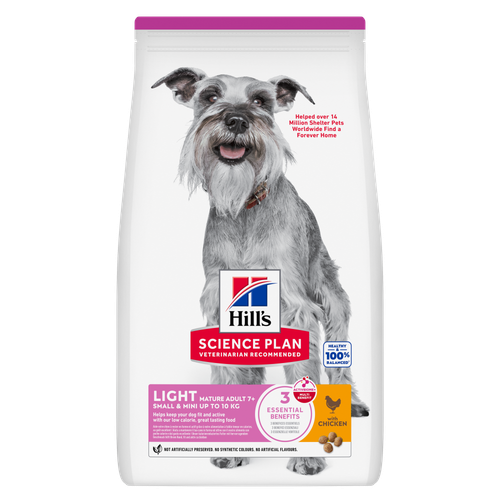 Light Small & Mini Mature Adult Hundefutter
Light Small & Mini Mature Adult HundefutterHill’s Science Plan Light Mature Adult Small & Mini Hundefutter mit Huhn ist ein Alleinfuttermittel, das speziell mit der ActivBiome+ Multi-Benefit-Technologie formuliert wurde.
Mit unserem kalorienarmen, wohlschmeckenden Futter bleibt dein Hund fit und aktiv.
Eine präzise Ernährung für weniger aktive ältere Hunde kleiner Rassen, die ein kalorienarmes Futter benötigen, das hilft, ein gesundes Gewicht zu halten.Shop Now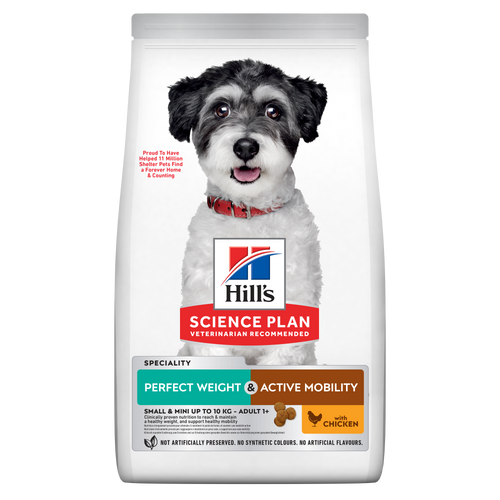 Perfect Weight + Active Mobility Hundefutter
Perfect Weight + Active Mobility HundefutterKlinisch erprobte Ernährung zum Erreichen und zur Erhaltung eines gesundes Gewichts sowie zur Unterstützung einer gesunden Beweglichkeit
Shop NowHäufige DiagnosenZugehörige Produkte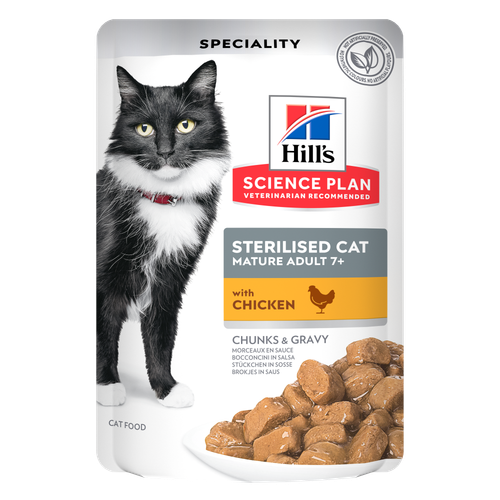 Sterilised Cat Mature Adult 7+ Nassfutter
Sterilised Cat Mature Adult 7+ NassfutterHill's Science Plan Sterilised Cat Mature Adult Nassfutter für Katzen mit Huhn ist ein Alleinfuttermittel für kastrierte Katzen ab einem Alter von 7 Jahren.
Shop Now Light Adult Katzenfutter mit Huhn
Light Adult Katzenfutter mit HuhnZarte Stückchen Huhn in Soße für Katzen, mit L-Carnitin und weniger Kalorien für ein optimales Gewichtsmanagement. Voll an hochwertigem Protein, Omega-6-Fettsäuren und Vitamin E für glänzendes Fell und gesunde Haut.
Shop Now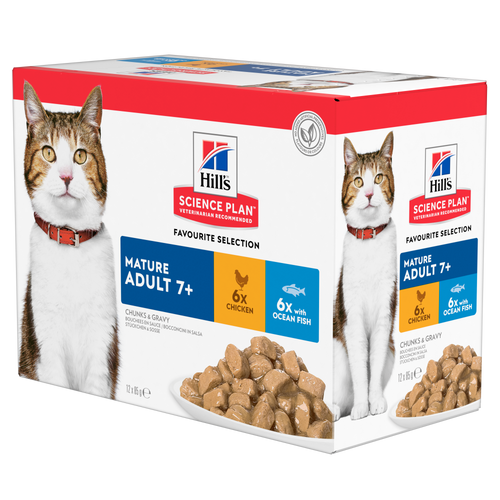 Mature Adult 7+ Multipack Nassfutter für Katzen
Mature Adult 7+ Multipack Nassfutter für KatzenZarte Stückchen in Soße für ältere Katzen. Hergestellt mit leicht verdaulichen Zutaten, hochwertigem Protein zur Erhaltung schlanker Muskeln sowie antioxidativem Vitamin C + E für optimale Gesundheit.
Shop Now -
Hund
- Tipps & Artikel zum Hund
-
Häufige Diagnosen Katze
- Gewicht
- Haut & Futtemittelempfindlichkeiten
- Harnwege
- Verdauung
- Gelenke
- Niere
- Genesung
- Zahnpflege
-
Lebensphasen - Hunde
- Ernährung von Welpen
- Ernährung von erwachsenen Hunden
- Ernährung von älteren Hunden
Katze- Tipps & Artikel zur Katze
-
Häufige Diagnosen Katze
- Gewicht
- Haut & Futtemittelempfindlichkeiten
- Harnwege
- Verdauung
- Niere
- Genesung
- Zahnpflege
- Stress
-
Lebensphasen - Katzen
- Ernährung von Kätzchen
- Ernährung von erwachsenen Katzen
- Ernährung von älteren Katzen
zugehörige Artikel Dürfen Hunde und Katzen Butter fressen?
Dürfen Hunde und Katzen Butter fressen?Erfahre alles darüber, ob Butter für Deinen Hund oder Deine Katze unbedenklich ist und was zu tun ist, wenn Dein Vierbeiner sie frisst.
Read More Was Du über die Kalorien von Tierfutter wissen solltest
Was Du über die Kalorien von Tierfutter wissen solltestLerne festzustellen, wie viele Kalorien Dein Hund oder Deine Katze jeden Tag braucht, wie Du ihre Kalorien zählen kannst und was zu tun ist, wenn sie zu viele aufnehmen.
Read More Ein Leitfaden für Haustierbesitzer:innen für sichere Wasserquellen für Haustiere
Ein Leitfaden für Haustierbesitzer:innen für sichere Wasserquellen für HaustiereStelle die Flüssigkeitszufuhr Deines Haustiers sicher, mit unserem Leitfaden für Haustierbesitzer:innen für sichere Wasserquellen für Haustiere. Für weitere Tipps zur Aufrechterhaltung der Gesundheit Deines Haustiers besuche Hill’s.
Read More -

 Wissenschaftlich basierte Ernährung macht den Unterschied, dem du vertrauen kannst
Wissenschaftlich basierte Ernährung macht den Unterschied, dem du vertrauen kannst
Verdauungsgesundheit bei Katzen
Verdauungsgesundheit bei Katzen
Was sind Verdauungsprobleme bei Katzen?
Eine Verdauungsstörung (oder Magen-Darm-Störung) ist jede gesundheitliche Situation, die verhindert, dass deine Katze ihre Nahrung richtig verdaut oder die dazu führt, dass sich die Geschwindigkeit verändert, mit der die Nahrung den Verdauungstrakt passiert. Ignoriere die Anzeichen nicht! Wenn deine Fellnase Symptome einer Verdauungsstörung zeigt, solltest du dich sofort an deine Tierarztpraxis wenden.

Anzeichen dafür, dass Deine Katze ein Verdauungsproblem hat
Die häufigsten Anzeichen für Magenprobleme und Verdauungsstörungen bei Katzen sind weicher Kot oder Durchfall. Möglicherweise stellst du auch einige oder alle der folgenden Anzeichen bei deiner Katze fest.




Anzeichen dafür, dass Deine Katze ein Verdauungsproblem hat
Die häufigsten Anzeichen für Magenprobleme und Verdauungsstörungen bei Katzen sind weicher Kot oder Durchfall. Möglicherweise stellst du auch einige oder alle der folgenden Anzeichen bei deiner Katze fest.




Beispiele für häufige Verdauungsstörungen
Verdauungsstörungen können aus verschiedenen Gründen auftreten, und alle können dazu führen, dass sich deine Katze nicht wohl fühlt. Denke daran, dass Durchfall bei Katzen, die draussen ihr Geschäft verrichten, oft schwer zu erkennen ist. Wenn du den Verdacht hast, dass deine Katze Probleme hat, solltest du ein Katzenklo bereitstellen, damit du sehen kannst, was vor sich geht. Im Folgenden findest du einige der häufigsten Verdauungsprobleme, die wir bei Katzen beobachten.


Dies ist die häufigste Ursache für eine Magenverstimmung bei Katzen. Dabei treten in der Regel Erbrechen und Durchfall plötzlich auf. Das kann viele Ursachen haben, wie z. B. das Fressen von etwas "Ungewöhnlichem" (oder, wie es viele Katzen gerne tun, das Fressen einer halben Maus, von der wir den Rest finden müssen!) oder Parasiten, Viren und Haarballen, um nur einige zu nennen.
Im Gegensatz zu den soeben erwähnten plötzlich auftretenden Erkrankungen treten chronische Darmerkrankungen langsamer auf und dauern in der Regel lange an. Durchfall und Gewichtsverlust sind häufige Anzeichen. Auch hier kann es viele verschiedene Ursachen geben, z. B. Futtermittelallergien, Immunreaktionen und genetische Faktoren.
Wenn sich der Kolon, der Hauptteil des Dickdarms, entzündet, spricht man von einer Kolitis. Sie ist in der Regel sehr charakteristisch und die meisten Katzen zeigen die gleichen Anzeichen: Sie sehen aus, als müssten sie dringend Kot absetzen, sie können sich beim Kotabsatz anstrengen, aber es kommt nicht viel heraus, und eines der klassischen Anzeichen für eine Kolitis ist frisches Blut und/oder Schleim im Kot.
Genau wie bei Menschen fällt Katzen bei Verstopfung der Kotabsatz schwer, und sie gehen möglicherweise viel seltener auf die Toilette. Verstopfung kann durch viele Dinge verursacht werden. Das Fressen von Knochen, Federn und Fell kann dazu führen, dass der Kot hart und schwer abzusetzen ist. Auch das Vorhandensein von vielen Haaren, insbesondere bei langhaarigen Katzen, oder ein träger Darm führen dazu, dass der Kot trocken und schwer abzusetzen ist. Einige Rassen wie die Siamkatze neigen eher zu einer Darmträgheit als andere. Dies kann zu einem sogenannten Megakolon führen.
Es handelt sich um eine komplexe Erkrankung bei Katzen, die aufgrund vager Anzeichen schwer zu diagnostizieren ist. Zu diesen Anzeichen gehören Erbrechen, Lethargie und Appetitlosigkeit. Bei Katzen scheint sie zu kommen und zu gehen und geht oft mit anderen Problemen wie unerwünschten Futtermittelreaktionen und entzündlichen Darmerkrankungen einher.
Katzen können aus verschiedenen Gründen schlecht auf bestimmte Nahrungsmittel reagieren, die wir als unerwünschte Futtermittelreaktionen bezeichnen. Echte Lebensmittelallergien sind seltener, als man denkt, und sie werden häufig durch Proteine in Lebensmitteln wie Huhn, Fisch und Milch verursacht. Futtermittelallergien können zu Erbrechen und Durchfall führen, aber auch zu Hautproblemen wie Juckreiz und übermäßiger Fellpflege.
Wie kannst du helfen?
Wenn du den Verdacht hast, dass deine Katze an einer Verdauungsstörung leidet, solltest du zunächst mit deiner Tierarztpraxis über mögliche Behandlungen sprechen, die ihr helfen können. Du kannst deiner Katze zudem helfen, indem du die Anzahl der Stressauslöser in ihrer Umgebung mit einigen dieser Vorschläge reduzierst:


Behalte eine Routine bei
Veränderungen in der Umgebung oder der Routine Deiner Fellnase können zu Magen-Darm-Beschwerden führen. Wenn du deiner Katze eine ruhige, sichere Umgebung bietest und sie regelmäßig zum Spielen animierst, kannst du ihr helfen, ihre Angst zu überwinden.


Vorbeugung
Parasiten wie Spul- und Hakenwürmer können Magen-Darm-Probleme verursachen. Wenn deine Katze also kein reiner Stubentiger ist, sondern auch ins Freie rauskommt, solltest du dafür sorgen, dass sie die richtige Vorbeugung erhält.


Die richtige Ernährung
Futter mit leicht verdaulichen Zutaten können magenschonend wirken. Frage deine Tierarztpraxis, wie du das Futter deiner Katze umstellen kannst, ohne den Magen deiner Katze weiter zu belasten.
Wie kannst du helfen?
Wenn du den Verdacht hast, dass deine Katze an einer Verdauungsstörung leidet, solltest du zunächst mit deiner Tierarztpraxis über mögliche Behandlungen sprechen, die ihr helfen können. Du kannst deiner Katze zudem helfen, indem du die Anzahl der Stressauslöser in ihrer Umgebung mit einigen dieser Vorschläge reduzierst:


Behalte eine Routine bei
Veränderungen in der Umgebung oder der Routine Deiner Fellnase können zu Magen-Darm-Beschwerden führen. Wenn du deiner Katze eine ruhige, sichere Umgebung bietest und sie regelmäßig zum Spielen animierst, kannst du ihr helfen, ihre Angst zu überwinden.


Vorbeugung
Parasiten wie Spul- und Hakenwürmer können Magen-Darm-Probleme verursachen. Wenn deine Katze also kein reiner Stubentiger ist, sondern auch ins Freie rauskommt, solltest du dafür sorgen, dass sie die richtige Vorbeugung erhält.


Die richtige Ernährung
Futter mit leicht verdaulichen Zutaten können magenschonend wirken. Frage deine Tierarztpraxis, wie du das Futter deiner Katze umstellen kannst, ohne den Magen deiner Katze weiter zu belasten.
Mehr Produkte
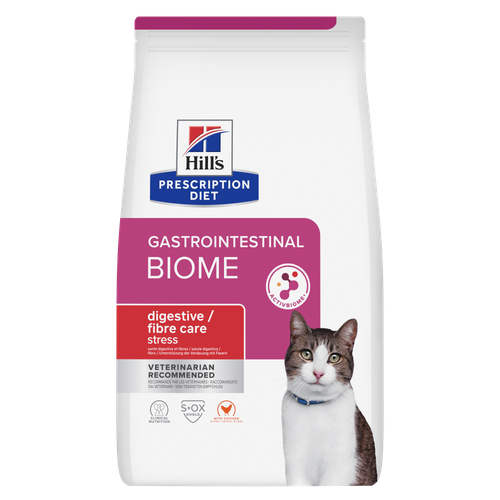
Hill’s Prescription Diet Gastrointestinal Biome Stress Trockenfutter für Katzen ist eine Ernährung mit hervorragendem Geschmack und einzigartiger Zusammensetzung, die hilft, das emotionale Gleichgewicht bei Katzen mit Verdauungsstörungen zu fördern. Klinische Ernährung mit hohem Fasergehalt zur Förderung eines regelmäßigen, gesunden Kotabsatzes in nur 24 Stunden. Hergestellt mit der ActivBiome+ Technologie zur raschen Versorgung des Darm-Mikrobioms und zur Unterstützung des Managements von komplexen Magen-Darm-Beschwerden. Hergestellt mit zugefügten Zutaten zur Förderung des emotionalen Gleichgewichts.
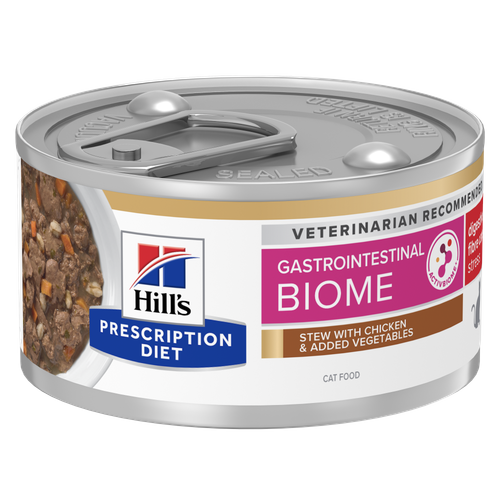
>Hill’s Prescription Diet Gastrointestinal Biome Stress Nassfutter für Katzen ist eine Ernährung mit hervorragendem Geschmack und einzigartiger Zusammensetzung, das hilft, das emotionale Gleichgewicht bei Katzen mit Verdauungsstörungen zu fördern. Klinische Ernährung mit hohem Fasergehalt zur Förderung eines regelmäßigen, gesunden Kotabsatzes in nur 24 Stunden. Hergestellt mit der ActivBiome+ Technologie zur raschen Versorgung des Darm-Mikrobioms und zur Unterstützung des Managements von komplexen Magen-Darm-Beschwerden. Hergestellt mit zugefügten Zutaten zur Förderung des emotionalen Gleichgewichts.
>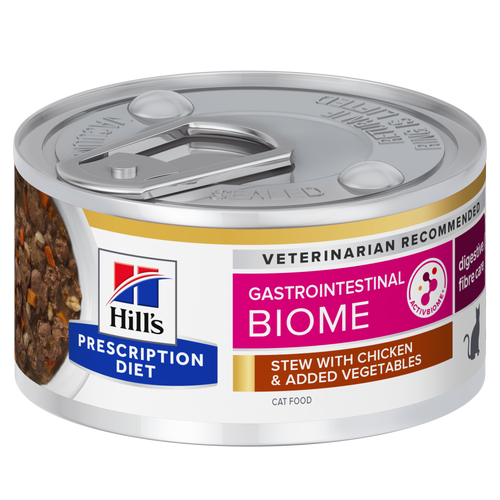
Hill's Prescription Diet Gastrointestinal Biome ist ein Nassfutter für Katzen mit hohem Fasergehalt, das klinisch erwiesen in nur 24 Stunden einen regelmäßigen, gesunden Kotabsatz fördert und hilft, das Risiko für ein erneutes Auftreten zu reduzieren. Angereichert mit der ActivBiome+ Technologie zur raschen Versorgung des Darm-Mikrobioms und zur Unterstützung des Managements von komplexen Magen-Darm-Beschwerden.
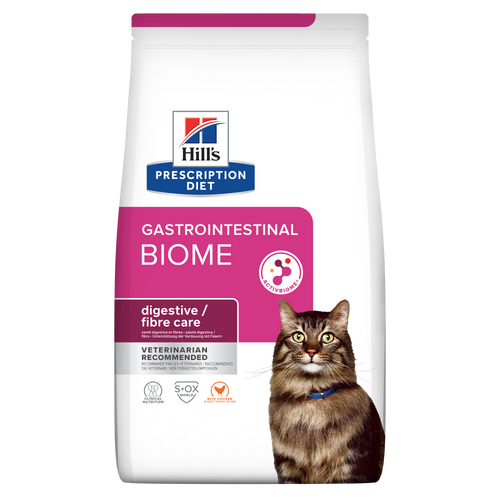
Hill's Prescription Diet Gastrointestinal Biome ist ein Trockenfutter für Katzen mit hohem Fasergehalt, das klinisch erwiesen in nur 24 Stunden einen regelmäßigen, gesunden Kotabsatz fördert und hilft, das Risiko für ein erneutes Auftreten zu reduzieren. Angereichert mit der ActivBiome+ Technologie zur raschen Versorgung des Darm-Mikrobioms und zur Unterstützung des Managements von komplexen Magen-Darm-Beschwerden.
Weitere Artikel dazu

Schokolade ist bekanntlich giftig für Hunde, aber auch für Katzen kann sie absolut schädlich sein. Erfahre hier, warum Schokolade für Katzen schlecht ist und was zu tun ist, wenn sie Schokolade gegessen hat.

Get information on whether cheese is safe for your cat, if there are any kinds that are better than others, or if they should avoid this snack altogether.

Viele menschliche Lebensmittel sind für Katzen gefährlich. Lesen Sie mehr über 5 der schlimmsten giftigen Lebensmittel, die Ihre Katze sogar töten können – und wie viel es davon braucht, um ihr zu schaden.

Mit diesem Rezept von Hill’s Pet Nutrition kannst Du hausgemachte Leckerlies für Deine Katze zubereiten, die dabei auch richtig gesund sind.